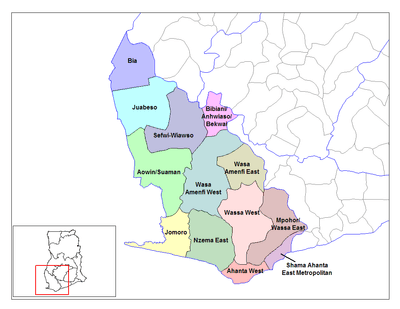Western Region (Ghana)
| Western Region | ||
|---|---|---|
| Region | ||
| ||
 Location of Western Region in Ghana | ||
 Districts of Western region | ||
| Country | Ghana | |
| Capital | Sekondi-Takoradi | |
| Districts | 22 | |
| Government | ||
| • Regional Minister | Paul Evans Aidoo | |
| Area | ||
| • Total | 23,921 km2 (9,236 sq mi) | |
| Area rank | Ranked 4th | |
| Population (2010 Census) | ||
| • Total | 2,376,021 | |
| • Rank | Ranked 4th | |
| • Density | 99/km2 (260/sq mi) | |
| GDP (PPP) | ||
| • Year | 2013 | |
| • Per capita | $5,150 | |
| GDP (Nominal) | ||
| • Year | 2013 | |
| • Per capita | $2,500 | |
| Time zone | GMT | |
| Area code(s) | 031 | |
| ISO 3166 code | GH-WP | |
The Western Region is located in south Ghana, spreads from the Ivory Coast border in the west to the Central region in the east, includes the capital and large twin city of Sekondi-Takoradi on the coast, coastal Axim, and a hilly inland area including Elubo. It includes Ghana's southernmost location, Cape Three Points, where crude oil was discovered in commercial quantities in June 2007. The Western Region enjoys a long coastline that stretches from South Ghana's border with Ivory Coast to the Western region's boundary with the Central Region on the east.
The Western Region has the highest rainfall in Ghana, lush green hills, and fertile soils. There are numerous small and large-scale gold mines along with offshore oil platforms dominate the Western Region economy.
The culture is dominated by the Akans; the main languages are Akan and English.
Tourism
The largest rivers are the Ankobra River, the Bia River, and the Pra River in the east, with the Tano River partly forming the western national border. The area is known for the UNESCO World Heritage Site and village of Nzulezo, built entirely on stilts and platforms over water, and the Ankasa Protected Area. There is a series of imposing Portuguese, Dutch, British, and Brandenburgian forts along the coast, built from 1512 on.
Education
The Western region has many post-secondary schools, including teachers' and nursing colleges, polytechnics, and a university at Tarkwa, the University of Mines and Technology.
Districts
The Western Region of South Ghana contains the following 22 districts:
| Districts in Western region | ||
|---|---|---|
| # | District | Population |
| 1 | Ahanta West | |
| 2 | Aowin/Suaman | |
| 3 | Bia | |
| 4 | Bia East | |
| 5 | Bibiani/Anhwiaso/Bekwai | |
| 6 | Bodi | |
| 7 | Ellembelle | |
| 8 | Jomoro | |
| 9 | Juabeso | |
| 10 | Mpohor | |
| 11 | Mpohor/Wassa East | |
| 12 | Nzema East | |
| 13 | Prestea-Huni Valley | |
| 14 | Sefwi Akontombra | |
| 15 | Sefwi-Wiawso | |
| 16 | Sekondi-Takoradi Metropolitan | |
| 17 | Shama | |
| 18 | Suaman | |
| 19 | Tarkwa-Nsuaem Municipal | |
| 20 | Wasa Amenfi East | |
| 21 | Wasa Amenfi West | |
| 22 | Wasa Amenfi Central | |
| Total | ||
Famous native citizens
| Famous native citizens of Western region | |||||
|---|---|---|---|---|---|
| # | Citizen | Settlement | |||
| 1 | Samuel Inkoom | Sekondi-Takoradi | |||
| 2 | Nadia Buari | Sekondi-Takoradi | |||
| 3 | Boris Kodjoe | Sekondi-Takoradi | |||
| 4 | John Atta Mills | Tarkwa | |||
| 5 | Kwame Nkrumah | Nkroful | |||
| 6 | Anton Wilhelm Amo | Axim | 7 | John Asokomfo Afful | Takoradi |
References
Sources
 |
|
|
|
 |
| |
|
Ashanti | ||
| ||||
| | ||||
| Atlantic Ocean | Atlantic Ocean | Gulf of Guinea |
Coordinates: 5°30′N 2°30′W / 5.500°N 2.500°W
.gif)